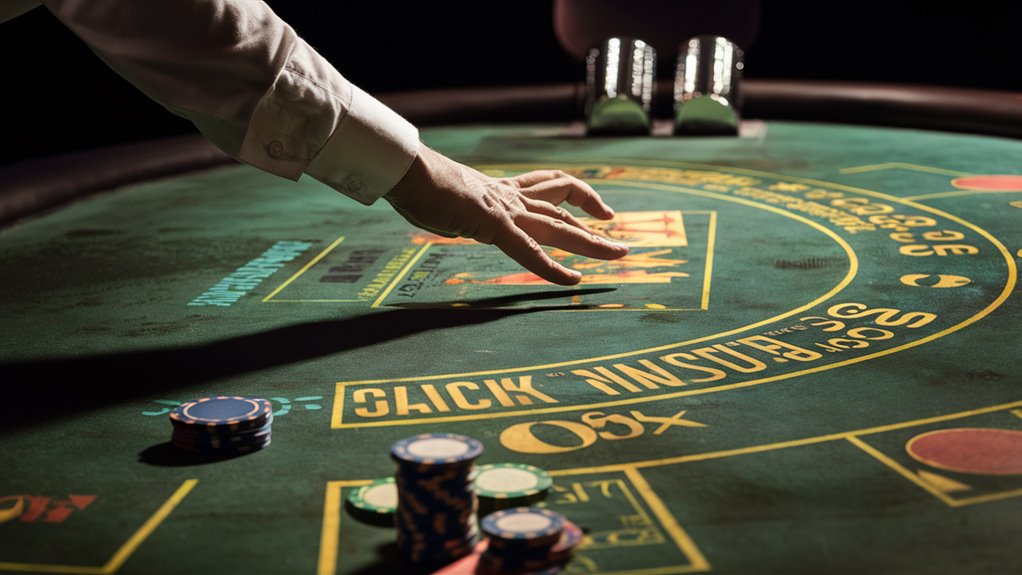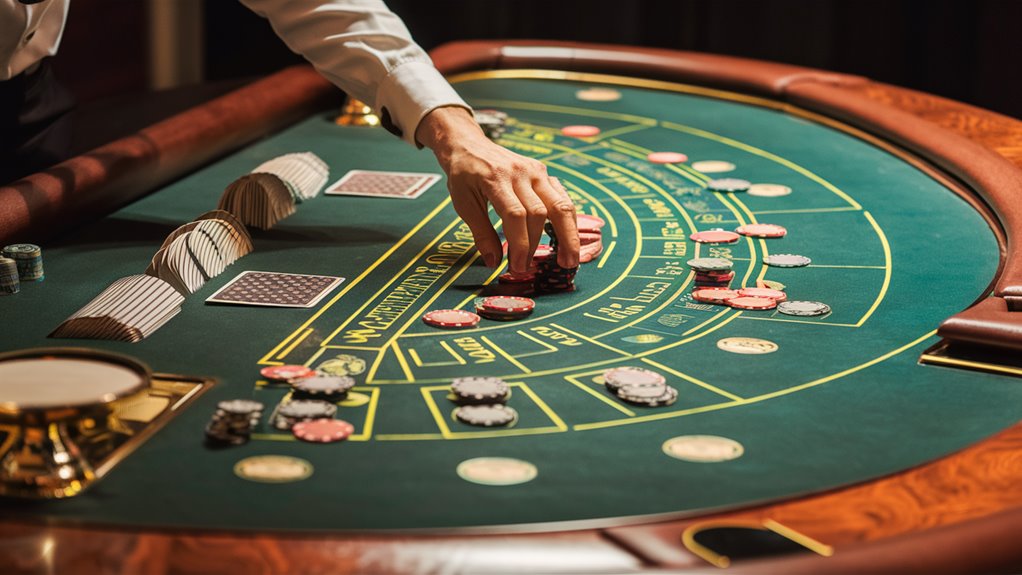How to Stay Away from Bad Blackjack Games: Must-Know Signs

Key Signs to See at the Blackjack Table
Bad house rules are the first sign for smart players. Look out for:
- 6:5 blackjack pays, rather than the normal 3:2.
- Dealers that hit on soft 17.
- Less options for splitting pairs.
These rules bump up the house edge and cut down player odds.
Tech Hints to Keep an Eye On
Deck usage is key for game quality. Stay away from tables with:
- Less than 75% deck usage.
- Never-ending shuffle machines.
- Too much deck reshuffling.
- 공식 검증 방법 보기
Signs from Table Moods
Watch the vibe at the table for:
- Odd dealer actions.
- Players who work together weirdly.
- Rules changing mid-game.
- Dealers who are all over the place.
How to Manage Your Money Right
Keep tight control on your funds:
- Never play without at least 50x the minimum bet.
- Set firm loss caps.
- Keep track of how you are doing.
- Keep gambling money separate.
Smart Ways to Steer Clear
Good players know choosing games matters:
- Look over the table before you sit.
- Keep watching for rule changes.
- See if the dealer acts professional.
- Think about how the table feels and how players act.
Getting these dodge moves down is just as key as being good at the game itself for making money over time. Aquatic-Themed Tactics in Realistic Odds
Bad House Rules
Know What the House Rules Mean for Your Play
Bad house rules at casinos can really mess with your chances and cut into your wins. It’s important to walk away from games with bad setups to play the best you can.
Rules You Need to Watch
The blackjack pay rate show you a lot about the game. Normal 3:2 pays are good, but 6:5 pays add about 1.4% to the house edge – a bad deal for you. Dealers hitting on soft 17 adds another 0.2% against you.
More tough rules like less options to double down and not being able to split after doubles take away more of your chances to win. Games that don’t let you split pairs or stop re-splitting aces also hurt good game plans.
Picking the Best Games
Being able to surrender helps you manage bad hands better. The best games let you:
- Do over with aces.
- Double after splits.
- Use good double down rules.
- Split multiple times.
Games like these can drop the house edge to below 0.5%, making them great for smart play. Looking hard at the rules before you play helps keep your wins high and losses low.
Trouble with Deck Usage
What Bad Deck Usage Means for Blackjack
Why Deck Usage is a Big Deal
Deck usage is huge for winning at blackjack. When you pick a blackjack table, how deep they cut the deck before they shuffle again really matters for your chance to win. Into Crackling Hot Bonus Flares
How Little Usage Messes with Card Counting
Shallow usage messes up card counting. Deep usage lets players know more about what cards are left and make smarter bets. Too much shuffling stops players from using a good count to their advantage.
What Good Deck Usage Looks Like
Levels of Usage You Should Look For
- Stay away from games where they cut the deck in the first half.
- Look for at least 75% usage.
- Aim for 80% or more if you can.
- Single and double deck games usually mean better usage than big deck games.
Smart Game Choosing
For real smart play, you need to scout casinos to find games with good usage. Even the best basic tactics can’t fix the bad odds from low deck usage when you’re trying to count cards.
Betting Minimums and Limits
Know Table Limits and Betting Minimums

Basics of Table Limits
Betting minimums and table limits are key when you pick your blackjack table. Each table shows both the least and most you can bet, shaping how you manage your money and your possible wins.
These limits are big clues for picking your table and planning your bets.
Rules for Good Money Management
A key rule for keeping your money safe is having at least 50x the minimum bet ready to play. So, a $25 minimum bet table means you need $1,250 to play well. This money helps you handle ups and downs while letting you bet smart during good times.
Smart Game Choosing
Picking a table must work with your money limits and how you plan to bet. High minimum tables can eat up small money fast, while low max limits can stop you from making big wins in good times. Good tables let you play for a long time and bet big when it’s right.
Points to Think About for Picking a Table:
- Posted minimum bets need to match your total money.
- Max limits should let you spread your bets as planned.
- Spreading bets should fit within table limits.
- Your money should last for a good long playing time.
- Think about risks and rewards from the limit setup.
Make Your Play Count
Pick tables that balance doable minimum bets and flexible max limits. This setup lets you play longer and use smart bet changes to make the most of good times, helping both your game last and your wins grow.
Signs at Tables to Watch Out For
Signs at Casino Tables You Need to Watch
Watch Out for Dealer Actions
Good dealers keep a steady, even game flow. Watch for worrying signs like:
- Rushing or messing up the card flow.
- Often wrong with payouts or card hands.
- Signs of being too tired, hurting the game quality.
- Shuffling in strange ways, not like normal.
Look at How Players Act
The feel at the table really changes how well you can play. Don’t sit at tables showing:
- Players signaling each other oddly.
- Players betting together in strange ways.
- Loud or drunk people messing up the focus.
- Mean talks that throw off concentration.
Assessing Table Rules
Bad rule changes can really hurt your chance to win:
- 6:5 Blackjack pays versus the normal 3:2 odds.
- Shufflers that stop you from counting.
- Rules that change while you play.
- Weird dealing that ups the house edge.
Signs of Bad Casino Practices
Keep an eye for trouble signs at the table:
- Odd rule changes while you play.
- Weird payout setups.
- Not regular dealing styles.
- Last-minute limit changes without telling you.
These signs point out bad games you should avoid to keep your money safe.
Signs Your Money Managing is Off
Big Red Flags for Managing Your Gambling Money
Signs of Bad Money Handling
Watching your money closely in gambling means catching signs that can eat up your cash fast. These big warnings need fast action to stay on top of your game and make sure you don’t run out of cash.
Chasing Losses
Chasing losses is a major danger, happening when players bet more after losing to try to win back their money. This often leads to using up money fast and making bad choices.
Using Money Wrong
Using money not meant for betting shows you’re off track. Signs of this include:
- Taking out cash at ATMs during play.
- Touching money needed for key bills.
- Borrowing money to keep up the game.
Not Keeping Wins Safe
Being bad at keeping wins shows when players:
- Don’t keep their big wins safe.
- Ignore when they planned to stop.
- Play longer than they meant to.
Betting Too Much
Betting scared money – cash needed for day-to-day life – is a sure sign your money plan is failing. This always leads to:
- Making bets based on fear.
- Not sticking to basic smart moves.
- A high risk of big losses.
Going Over Set Limits
Going past your set betting caps and playing longer than you planned shows your money handling is slipping. These acts often come before losing a lot of money and need to be fixed right away.
